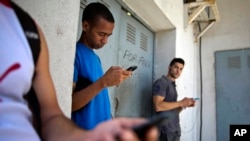Cuba on Thursday accused the US Senate of "aggression" for adopting an amendment that would see the United States provide Cubans with internet access, in an attempt to help them circumvent Havana censorship.
Cuba's government has a history of controlling internet and data access and last month cut off connectivity services for five days after Cubans used social media to spread word of historic nationwide anti-government protests that broke out on July 11.
"I denounce the US Senate's aggression carried out via an amendment on internet in Cuba, which contributes to the lucrative business of Florida's political-subversive machinery" Foreign Minister Bruno Rodriguez said on Twitter.
Republican Senator Marco Rubio, who represents Florida and is of Cuban origin, proposed the amendment, which has been tacked onto the Senate's budget resolution and would create a fund to implement the technology necessary to provide internet access in the island nation.
"The technology exists to do this without delay, and I urge the (Joe) Biden administration to begin moving forward immediately," Rubio said on Tuesday.
On Wednesday, the U.S. Treasury and Commerce departments issued a fact sheet that details the steps to license internet and telecommunications services related to Cuba.
Rodriguez said US sanctions that were ramped up during Donald Trump's administration "are the fundamental obstacle to the Cuban people's free and sovereign internet access."
The Rubio amendment proposes deploying satellites, balloons and offshore access points to provide Cubans with unrestricted connectivity.







